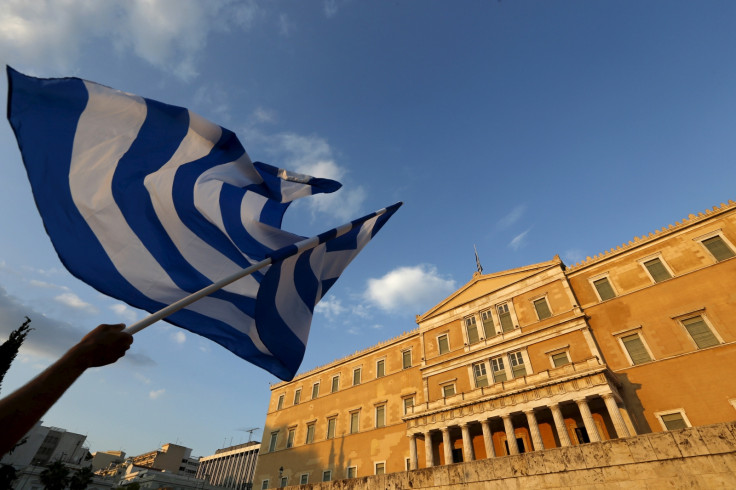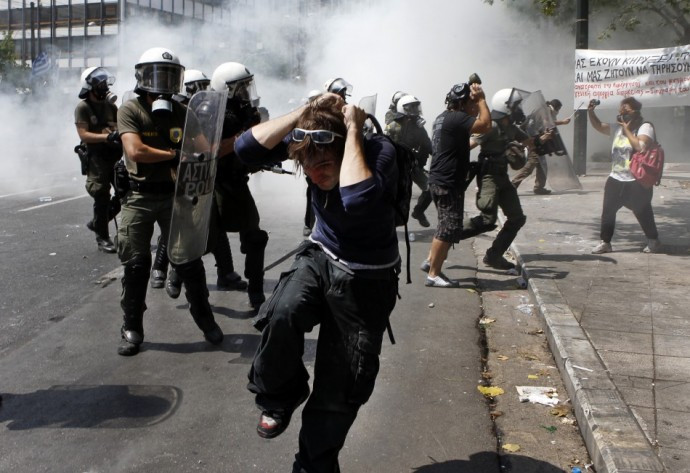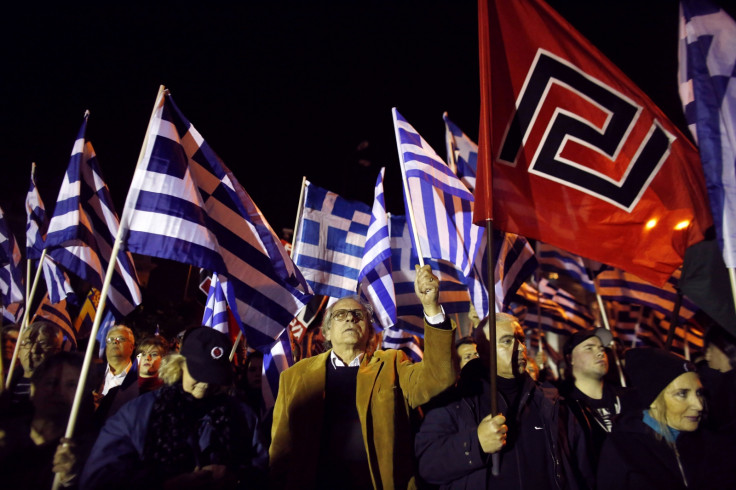Letter from Athens: Greece divided over exit as anarchists and neo-Nazis wait in the wings

More than 18,000 protesters gathered in front of the Greek parliament last night (30 June) in the pouring rain, rallying for a 'Yes' vote in Sunday's referendum in favour of the latest austerity package agreed by the country's creditors.
Many of those protesting were doing so for the first time. Dimitris Papadopoulo, a 35 year old who owns a small construction business, had never been on a demonstration before.
"We're trying to save our businesses, our fortunes," he said. "We have been trying hard for five years... now he, Tsipras, is trying to destroy us," he said.
While the demonstration passed peacefully, the police were on guard. Vans blocked the road leading up to Syntagma Square and officers in riot gear lined the streets.
Accepting something, rejecting something - doesn't exist any more
"I'm here because Greece belongs in Europe – in my opinion, it would be a disaster if we left," said a theatre director who had come to the demonstration with her one-year-old daughter. "I'm a working mother and if we return to the drachma, I would fear violence."
The real face of Greece's economic malaise was seen on 1 July when 1,000 banks opened for pensioners only so they could collect €120 in retirement cheques.
Greek Prime Minister Alexis Tsipras sent a letter to Greece's creditors in an apparent attempt at a last-minute deal, but it was met with a dismissive response by both Germany's finance minister, Wolfgang Schäuble, and prime minister, Angela Merkel.
"Accepting something, rejecting something – doesn't exist any more," Schäuble said.

As for those Greeks who have spent the past five years as part of the anti-austerity movement, they are now watching and waiting. Thus far, the reaction on the streets of the 'No' side has been relatively muted, with Monday's protest in Syntagma Square drawing less than 14,000 supporters.
At the same time, the only poll conducted after Syriza's referendum announcement on Friday, published in the Efimerida Ton Syntakton newspaper, shows support of 'No' at 52% of voters, beating 'Yes' at 33%.
In the bohemian neighbourhood of Exarcheia, known for its anarchist and hard-left politics, the tension is growing, with a demonstration planned for yesterday apparently cancelled, but leaving tell-tale burning bins that filled the air with black fumes.
Syriza, whose name is an acronym for the Coalition of the Radical Left, were voted into power in January to oppose austerity within the euro. There have already been a number of small-scale demonstrations against the government since their election, but these have never attracted more than 500 or so people. They have also been largely confined to Exarcheia.
On 23 June, around 30 anarchists infiltrated a pro-European demonstration, burning EU flags, but it was met with a swift response and arrests.
If a deal is signed before the referendum can take place, which is still a possibility, many of the seasoned anti-austerity protesters and street activists will feel betrayed.
Tsipras said on Monday that if Greeks vote 'Yes' for the deal in the referendum, Syriza will resign from power. This would provoke an even more volatile reaction. Elections are likely to lead to some form of 'grand coalition' as no one party can command a majority.
The latest poll conducted by Skai TV shows former government New Democracy has only 16% of the vote, and the centre-left party Pasok is in disarray with just 3.5%. The other option, another technocratic government like that imposed on Greece in 2011, would also prove provocative.
Neo-Nazi Golden Dawn are currently on trial, accused of operating as a criminal organisation, and while they may be finished as a party, the fall of Syriza could see them more active on the streets.
Syriza's handling of the police up until now has also helped to keep a lid on tensions. While they have been too busy with the eurozone negotiations to fulfil their pledges to disband the notorious DELTA riot squad, they have pursued a far more placatory approach to policing than their predecessors, the right-wing New Democracy.

Whatever happens, they will not want to resort to the aggressive policing of protesting that Greece has seen over the past five years. Syriza's rapid rise from a fringe party to a formidable electoral force owed much to their support of the right to protest, going back to the 2008 Greek riots.
The riots were sparked by the lethal shooting of a teenager in the Exarcheia district by two policemen. It was seen as an unprovoked killing, tapping into anger, not only with the police, but also widespread frustration of the young faced with unemployment and the beginning of the global financial crisis.
Syriza not only signalled their ideological support for the riots, but were also actively present on the demonstrations. It helped them capture the support of a demographic that was later caught up in the anti-memorandum protests of 2010-2011.
This demographic also forms the mass of the solidarity movements that have helped keep Greek society afloat, at a time when the public sector has been under extreme strain. There are well over 400 citizen-run groups in Greece, including 40 health clinics that have sprung up since the anti-austerity protests of 2011 and Syriza's Thessaloniki Manifesto, which they ran on in January, pledged to work alongside these social movements.
In February, the far-left Antarsya group called on the wider left to "co-ordinate their forces and to invite workers, the people and youth and put up a large movement against the agreement". They will be on the frontline of protests against the signing of any deal seen as extending the austerity memoranda viewed as "humiliating" for Greece and a betrayal by Syriza.
In 2011, in response to the memoranda, large-scale violent protests were commonplace, with February alone seeing more than 100,000 Greeks involved in strikes and demonstrations. Thus far, the streets of Greece are relatively peaceful. But this peace may not last.
© Copyright IBTimes 2025. All rights reserved.






















